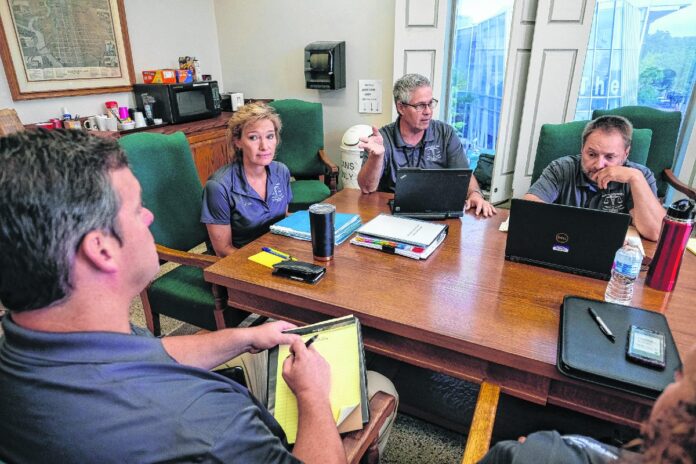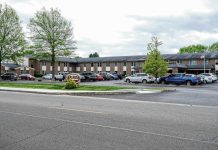
A new Bartholomew Court is emphasizing problem-solving instead of punishment, and assistance instead of one-size fits all incarceration, for those seeking addiction recovery.
The Bartholomew County Adult Drug Recovery Court is the newest of the county’s three-problem solving courts, designed to help and provide skills to high risk and high need nonviolent criminal offenders who have Substance Use Disorder.
While the new court has been in existence for three months, the benefits of having the new court may not become apparent for three to five years, said Bartholomew Circuit Court Judge Kelly Benjamin, who supervises the new court.
“It took each participant decades to get to where they are as criminals,” Benjamin said of the individuals who are referred to the court. “It’s going to take years to see positive results.”
[sc:text-divider text-divider-title=”Story continues below gallery” ]Click here to purchase photos from this gallery
Often simply called “drug court,” each participant is required to spend about 18 to 24 months in the program.
Not every addicted offender is suitable for drug court, Benjamin said. It is specifically designed to provide intense services to those who are considered medium to high in both need and risk, she explained. These are the type of people who feel overwhelmed if ordered to go to five different places to seek different forms of assistance while battling their addiction, the judge said.
“They have a brain that won’t be working right for the next year-and-a-half,” Benjamin said in regard to opioid addicts. “ We have to retrain their brain and get them to lead a productive life — all at the same time.”
Every Tuesday afternoon, Benjamin swaps courtrooms with Superior Court 1 Judge James Worton, so drug court proceedings can have sufficient space for more than two dozen participants and a 10-member drug court staff, as well as others in attendance.
From noon until 1 p.m. each Tuesday, the judge and her drug court staff exchange information on each of the 25 to 30 drug court participants, as well as review assessments on new applicants, the judge said.
While defendants on traditional probation likely won’t see the judge unless they get into trouble, drug court participants must appear before Benjamin and her staff every Tuesday, Benjamin said. They are also required to undergo two drug screens per week, as well at attend intensive outpatient therapy sessions, she said.
The court strives to eliminate “one size fits all” sentencing, court officials said. Instead, the court utilizes a team working to find underlying problems that contributes to criminal behavior, Benjamin said.
Assistance and encouragement is then provided with a goal of reuniting families and repairing lives, the judge said.
“It’s really a lot less adversarial than your traditional courtroom,” said drug court public defender Mike DeArmitt, who worked as a prosecutor for 15 years. “We are indeed here to help solve problems for people.”
The new court will be evaluated on Aug. 27 as Indiana Office of Court Services considers whether to grant the local program permanent certification. The drug court has been operating under a provisional certification since starting on May 14, the judge said.
Helping over punishing
Every week, participants meet with drug court team members to discuss what is going on in their lives in areas such as family relationships, mental status, activities and hobbies, the judge said.
When a participant is facing barriers, a team member will help that person temporarily overcome challenges immediately, as well as seek permanent solutions, Benjamin said.
At this time, that team member most likely is case manager George “Chip” James, the judge said.
Housing, treatment, and community resources are what most drug court participants ask for when seeking assistance, James said.
“But the biggest obstacles they face are housing, transportation and employment,” James said.
The Alliance for Substance Abuse Progress Hub is expected to work with James to help participants overcome challenges when it opens this month in the Doug Otto Center, Benjamin said.
Created through ASAP, the new 2,000-square-foot Hub will provide a physical location where people seeking addiction treatment will find referrals and assistance, including help finding housing, social services and recovery options.
A learning experience
After three months, Benjamin said she has learned a great deal about those who have been in drug court, including whether they have seen their child or children, what type of mental health problems they are battling, how their therapy is progressing and even issues from childhood that may have led to a life of crime.
“Often, they don’t have a strong sense of self-worth,’ Benjamin said of those working with the drug recovery court team. “They don’t feel good about themselves, or they are depressed.”
The drug recovery court may offer substance abuse treatment through providers certified by the Department of Mental Health and Addiction. The court has partnerships with St. Peter’s Lutheran Church Lifeworks program, Centerstone and Columbus Regional Health’s new Treatment and Support Center which provides outpatient programs and medication-assisted treatment.
Relapses do occur and there are “significant responses” for those who are not truthful about the circumstances of their relapse, Benjamin said.
The judge may reassess the treatment and recovery plan for the individual, increase random drug screenings, order community service or increased visits to the drug court, or consequences could include a short-term jail stay.
There are already 45 adults drug courts throughout Indiana, with two more in the planning stages. Although local judicial officials have long talked about establishing such a court in Columbus, Benjamin said nobody was willing to make a commitment until resources were obtained.
“Resources for any problem-solving court are great because of not only the logistics, but also the administration and case management,” said Bartholomew County Court Services Director Brad Barnes, who also coordinates the drug court program.
The commitment finally took place when federal funding of $500,000 was obtained to provide financial resources to the drug court through 2022. In addition, the Columbus City Council and Bartholomew County Council agreed earlier this year to split the remaining $92,603 that was still required.
Public support
In the past, a number of judicial officials — such as Superior Court 1 Judge James Worton — have expressed concerns on whether drug court would receive the same level of public support and compassion as Veteran’s Court, which Worton has headed since early 2016.
It’s still too early to make any assessment regarding community support, James said.
But Benjamin says those who don’t support the ideals of problem-solving courts may want to consider the alternative.
“If the perspective and attitude is to ignore the fact that some people need additional help — and just keep locking them up in jail — we’ll have to build bigger prisons,” Benjamin said. “And then, when they get out and come back to our community, we won’t have resolved any problems.”
Five separate studies have determined that drug court is considerably more cost efficient for the public than traditional cases, she said. For example, drug court participants are provided with health insurance, so taxpayers don’t wind up paying for their medical care, she said.
“And in the end, most participants don’t commit another crime, become productive to society, and set a better example for their children,” the judge said. “You are not only improving the participant’s life, but also helping the entire community by stopping a destructive cycle.”
Skeptics can be reminded that anticipated positive results come from outcomes documented in several other communities, extensive training from national experts, and the guidance of medical, mental health and life skill experts, Benjamin said.
Benjamin has already been nominated by Indiana Supreme Court Chief Justice Loretta Rush to attend a national training seminar regarding the court’s role in the opioid epidemic, and bring that knowledge back to the state to help train others.
[sc:pullout-title pullout-title=”Drug court key personnel” ][sc:pullout-text-begin]
Judge: Kelly Benjamin.
Part-time magistrate: Kim Van Valer (covers Benjamin’s caseload while the Circuit Court judge is working on drug court cases.)
Special Drug Court prosecutor: Scott Andrews
Public defender: Michael DeArmitt
Case Manager: George "Chip" James
Program coordinator: Brad Barnes
Centerstone Behavioral Health service provider: Macy Kootz
St. Peters Lifeworks representative: Lisa Pein
Law enforcement representative: Columbus Police Officer Brandon Decker
Alliance for Substance Abuse Progress representatives: Tracey Clark and Nathan Walsh
[sc:pullout-text-end][sc:pullout-title pullout-title=”Three problem-solving courts” ][sc:pullout-text-begin]
Bartholomew County has created three problem-solving courts that seek to promote outcomes that benefit not only the justice involved individual and their family, but the victim and society as well. These courts were developed as an innovative response to deal with the needs of justice involved individuals, including drug abuse and mental illness.
Adult Drug Court: Provides screening, assessment, referral, service coordination and case management for individuals involved in the criminal justice system identified with drug issues. These services are available to individuals court-ordered to the program when arrested for, charged with or convicted of a misdemeanor or felony; or against whom a complaint for an infraction is filed or judgment for an infraction is entered. Overseen by Bartholomew Circuit Court Judge Kelly Benjamin.
Family Dependency Court: Serves parents with substance use disorders in Child in Need of Services (CHINS) cases. FDTC’s goals are to provide parents quicker access to treatment, reduce time children are in out-of-home placements, and reduce the reoccurrence of maltreatment due to substance use by parents and custodians. Overseen by Bartholomew County Juvenile Magistrate Heather Mollo.
Veterans Court: Closely monitors veterans in the court system who want treatment for alcohol/substance addiction or serious mental health illness. The mission is to successfully rehabilitate veterans involved in the court system using evidence based treatment to positively change their behavior to lead productive, law-abiding civilian lives. Overseen by Bartholomew Superior Court 1 Judge James Worton.
[sc:pullout-text-end][sc:pullout-title pullout-title=”Where to learn more ” ][sc:pullout-text-begin]
In 1997 the Indiana General Assembly transferred the responsibility for certification, training, and support of Court Alcohol and Drug Programs in Indiana from the executive branch to the Indiana Office of Court Services, formerly the Indiana Judicial Center.
Approximately 55 circuit, superior, county, and city courts throughout Indiana have court alcohol and drug programs.
More information is available online at in.gov/judiciary/iocs/2333.htm.
[sc:pullout-text-end]




